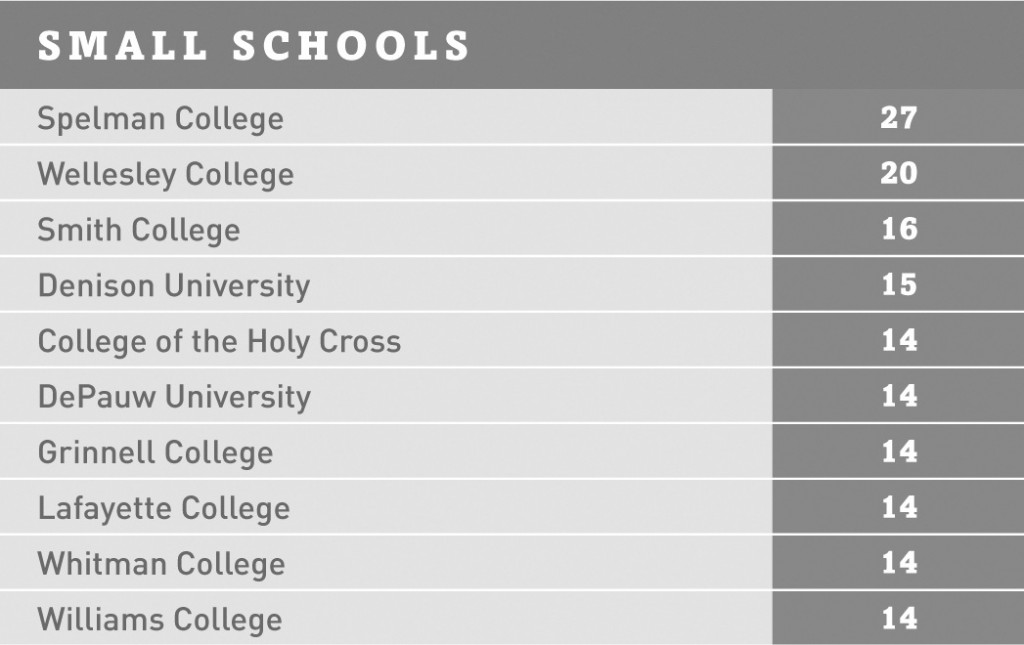By Fabiola Barral
barralfa@grinnell.edu
Founded in 1990, Teach for America (TFA) is a post-graduate service program for domestic students that requires corps members to spend at least a year teaching in low-income public schools around the country. Corps members usually make a two-year commitment—they are allowed to opt out at any time—and receive a full salary as well as benefits such as health care.
Over the last five years, TFA has accepted approximately 35 percent of Grinnell’s applicants. TFA distributes its rankings into three categories: large schools, medium schools, and small schools. In the past year, Grinnell ranked fifth in contributions to the program among small schools.
Grinnell first debuted on TFA’s top rankings in 2010 and in just three years it has now reached a record number of applicants. In 2008, eight graduates joined TFA and shortly after, in 2010, 13 students joined the program. In comparison, 20 percent of Grinnell’s eligible 2013 class applied for TFA and 14 total students are participating in the program this year.
The increase in applicants can be attributed to a combination of factors, not least of which is Grinnellians’ passion for social justice.
“We’re seeing a general increase in service applications. We see about 20% of our graduates go directly into post-graduate service programs, which is a high percentage,” said Doug Cutchins, Director of Social Commitment. “No one knows nationally, but I’m going to guess it’s less than one percent of college graduates who go into these types of programs. We’re number one on the country, not per capita, in raw numbers, for producing Lutheran Volunteer Corps members.”
In addition to the overall increase in applications to service programs, TFA attracted a large number of students due to increased recruitment efforts on the part of the organization and the on-campus recruiter.
“I think a lot of Grinnellians applied last year partially because Laura Carter-Stone ‘13 was an effective recruiter but I believe many Grinnellians see the inequality that exists in our educational system and they want to do something about it,” wrote Julie Bunt ’13 in an email to the S&B. “We’re a dedicated crazy bunch and our passion makes it easier to stick with things when the going gets rough—and it will get rough, believe me.”
TFA is also especially appealing for students looking to explore their options, especially regarding whether or not they want to pursue a career in education.
“It’s always been an option in the back of my mind. I really like how they work with low-income communities and I just felt like it’s a great opportunity to … to try to make a difference early on and it also helps to kind of bypass graduate school a little bit and to really figure out if I want to teach or not,” said Aaron Levin ’14, a TFA applicant.
Through TFA, recent college graduates become full-fledged members of the faculty and staff of their respective schools. Interestingly, many TFA applicants are not necessarily students with a plan to teach or with a degree in education.
“Mark Wilcox [‘09] was admitted to Cambridge for graduate school in Chemistry [and] declined the offer—to join TFA. He went to Baltimore, taught high school Chemistry for three years … now is in medical school at Johns Hopkins,” Cutchins said. “Think about the doctor he’s going to be because of what he experienced in TFA.”
Bunt acknowledged the challenges associated with any TFA experience.
“The summer training is intense and … in region the experience gets more intense … I think it’s definitely a valuable experience if you stay away from the national brand of TFA that is more like a corporation than an education reform movement,” she wrote. “Regions differ greatly and I’m always fascinated when I talk to Grinnellian friends in other regions. You have to come into it not looking to save kids or as a resumé filler, if you do that your kids will sniff you out and eat you alive. They’re the best system to keep you honest.”




















































